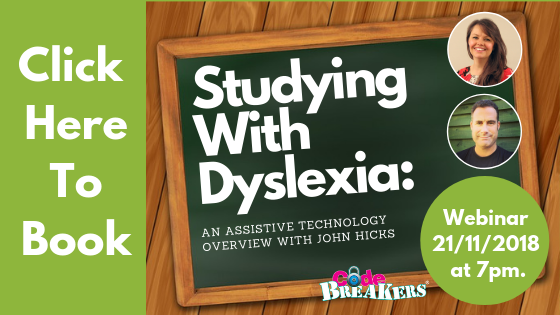Dyslexia: Why is spelling and grammar important?
How important are spelling and grammar and how far should we go to enforce correct usage when supporting dyslexic learners? What is the balance that should be maintained between good English language learning and dyslexia support for a child when they struggle with their language disorder? Find out what John Hicks believes we should be considering.
 |
| John Hicks - Dyslexia Blogger |
He didn't know about her dyslexia and when he found out, he was quite unapologetic about the very public way in which he corrected her. She took it all with good grace and I guess in the scheme of things it didn't really matter.
I have been doing a lot of thinking about this especially as our children who have to do GCSE examinations will be marked not only on their ability to learn but also by their ability to write with good spelling and grammar. This means that even if you totally know your subject and can recall every detail of your learning you may not get as high a mark if your spelling and grammar is not correct. In many ways for someone with dyslexia who is being taught without reasonable adjustments, the deck is rigged. They will not be able to reach perhaps as high a grade as they may well deserve given the level of effort that they will be putting into their studies just to keep up.
Sonia Ash has been campaigning to change the way that GCSEs are marked to reflect this and I totally support the campaign. If successful, all students will be able to be marked on their ability to learn the topics that are important to them. This has got to be more important than spelling and grammar, right?
Let's take a look at some examples of what happens when poor spelling and grammar happens in the public space and the impact.
Let's start with one that I was responsible for.
 First some context. I coach young people in schools around the topics of self-esteem and motivation. I believe strongly that to learn, you need to be motivated and this applies to all kids. I work with kids who are often excluded and yesterday I was delivering a group coaching session for a bunch of year 10 lads who are disengaged with education. The topic was on self-defeating beliefs and I used the concept of how self-defeating beliefs can mess up opportunities to be at our best in life, in other words, they 'sabotage' our opportunities.
First some context. I coach young people in schools around the topics of self-esteem and motivation. I believe strongly that to learn, you need to be motivated and this applies to all kids. I work with kids who are often excluded and yesterday I was delivering a group coaching session for a bunch of year 10 lads who are disengaged with education. The topic was on self-defeating beliefs and I used the concept of how self-defeating beliefs can mess up opportunities to be at our best in life, in other words, they 'sabotage' our opportunities.So I drew a picture and wrote the words 'The Sabotuer' and took a picture and posted it on social media.
The word 'SABOTEUR' always throws me! I often replace the 'O' with an 'A' and yesterday I checked this but still felt that there was something wrong with the spelling. I didn't have time before the session to check the spelling and correct it before the lads walked into the classroom.
When I posted the picture on social media, I received some comments that correctly pointed out that I had got the 'U' and the 'E' the wrong way round. So as this was on Facebook, the comments were obviously public and I was of course slightly embarrassed by my mistake.
In that post, I was trying to communicate aspects of the work that I was doing and not surprisingly, the focus became more about my spelling mistake.
 |
| Friendly banter from friends about my spelling mistake. |
For me, the learning here is very much about how we all need to spend some time to check what we put out into the public domain as the incorrect use of spelling or grammar can derail the focus or the point about which you are writing.
Here's another example of how important it is to ensure that spelling and grammar are correct especially when posting text out into the public domain.
This newspaper article went viral because the writer had not used a much-needed hyphen in her headline for the Pratt Tribune in the US. I must admit I have known about this article for a number of days simply because of the gaff and not because of the content which talks about an initiative called 'Disability Mentoring Day' and how local employers gave students work experience. I only know about the content because I wanted to check it before I told you about it.
If I wasn't writing a blog article I would have just remembered the opportunity to crack jokes about the title without the need to actually read the article. The spelling mistake became a barrier to me in reading the content, I would not have moved beyond the funny title.
What's the point?
The point I am making is that whilst I hate the idea that marking coursework or exams for spelling and grammar mistakes is necessary when really we should be focused on the learning content. There is a place for doing what we can to get that spelling and grammar correct as poor spelling and grammar can be a barrier to communication. It in itself makes reading content difficult and tiring and as such can lose the intended impact of the written piece.
 |
| Free 60 Day Demo Available. |
But if a student or certain blog writers (coughing self-consciously) can put measures in place to overcome these issues with having a language disorder such as dyslexia, we can make sure that we are able to effectively demonstrate our learning or communicating our thoughts.
I think that it is wrong for the education system to enforce good spelling and grammar when the needs of the dyslexic learner are not taken into account in terms of them being able to achieve those standards.
In this technological age, there are now so many ways of making sure that writers who struggle with spelling and grammar can reduce mistakes and be freed up to deliver the desired impact from their written work.
For me personally, I find the use of this technology invaluable. In this article, you will notice words such as 'because' and 'achieve' and each one I typed was spelt incorrectly. How do I know that? I know that because I use an add-on to my blogging platform called Grammarly which tells me when I have made spelling and grammatical errors. It is really helpful for me when I am writing on a web browser.
When using Microsoft Word, Grammarly is not so useful for me and I like to use a text to speech product such as SprintPlus which reads out my Word document and whilst MS Word can help with spelling mistakes, it is not so great with helping me with my grammar and so having the text read out is really useful as the PC will read the text out awkwardly if the grammar is incorrect thus prompting my attention. SprintPlus embedds into Microsoft Word as a 'tab' and so this means that I don't have to use an external programme to get the text to speech to work. I am left to focus on my document which is great from a concentration perspective.
Imagine the increase in the quality of literacy coursework if we made technology such as SprintPlus (and many others) to students in secondary education across the UK.
Want to know more? Free Webinar On Assistive Technology.
On the 21st November, I will be delivering a webinar with dyslexia assessor and tutor, Georgina Smith about the use of technology that can help with reading and writing in school.
I will give you an overview of the types of assistive technology available and I will give you links to free demos that you can try out. I will also mention technology that you probably are unaware of having access to already that you can utilise now. I am a huge believer in having a choice of which technology that we can use to help us with reading, writing and spelling.
If you would like to join me on the webinar please click the banner below to register.
 |
| Book your place on this free webinar. |










The first paper will remain unchanged but in the Second paper, compulsory questions will be five (5) and four (4) optional questions from seven (7) questions in section B. The new curriculum syllabus don't specify the optional topics but the total questions for Paper 2 will remain 12. Electrical Installation
ReplyDeleteGreat!!! I'm green of envy with your results dude.. You give me confidence and morale boosts after reading your great story.
ReplyDeletePSLE tuition online
PSLE tuition online
PSLE tuition
Your post is just outstanding! thanx for such a post,its really going great and great work.
ReplyDeletePrimary PSLE Tuition Singapore
It was really a nice article and I was really impressed by reading this article.
ReplyDeletepsle science tuition in singapore
psle science tuition in singapore
psle science tuition in singapore
psle science tuition in singapore
psle science tuition in singapore